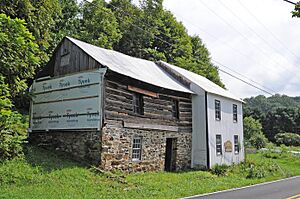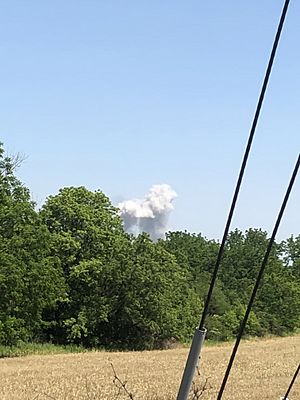Zionsville, Pennsylvania facts for kids
Quick facts for kids
Zionsville, Pennsylvania
|
|
|---|---|
|
Unincorporated community
|
|
| Country | |
| State | |
| County | Lehigh |
| Townships | Upper Milford, Lower Milford |
| Elevation | 200 m (600 ft) |
| Population | |
| • Metro | 865,310 (US: 68th) |
| Time zone | UTC-5 (Eastern (EST)) |
| • Summer (DST) | UTC-4 (EDT) |
| ZIP Code |
18092
|
| Area code(s) | 610 and 484 |
| Primary airport | Lehigh Valley International Airport |
| Major hospital | Lehigh Valley Hospital–Cedar Crest |
| School district | East Penn |
Zionsville is a small community located mostly in Upper Milford Township in Lehigh County, Pennsylvania. A small part of the village is also in Lower Milford Township. The West Branch Hosensack Creek forms its natural southeastern border. This creek flows into the Hosensack Creek and then into the Perkiomen Creek.
Zionsville is part of the Lehigh Valley area. This area is home to over 860,000 people. It is the 68th largest metropolitan area in the United States. Zionsville uses the ZIP Code 18092.
Contents
Zionsville's Past: A Look at History
Early Inhabitants: The Lenape Tribes
Long ago, the area where Zionsville is now was home to the Lenape Indian tribes. These tribes often lived near rivers and creeks. They used the rich land around these waterways for farming. Over time, the soil became less fertile from repeated planting. This made it hard to grow crops, so the Lenape tribes slowly moved away from the area.
European Settlers Arrive
In the 1600s, Dutch colonists came to the area. They traded European goods for animal pelts with the Lenape. Later, in 1682, William Penn and other Quaker colonists arrived. They started the Pennsylvania Colony near the lower Delaware River. A peace treaty was signed between the new British settlers and the Lenape tribes. However, many colonists arrived, and the Lenape were forced to move or join the new communities.
Changes in the 1700s
When William Penn passed away in 1718, his sons, John and Thomas Penn, took over. They changed some of William Penn's policies. To gain more land and money, they made an agreement with the Lenape known as the Walking Purchase. This agreement caused the Lenape to lose their land. Some Lenape then began to raid settlements. By 1788, most of the remaining Lenape left Pennsylvania. They moved to what was then called Ohio Country. This area included parts of modern-day Western Pennsylvania, Ohio, and Indiana.
Old Zionsville was founded in 1734. It was started by German settlers on Kings Highway Road. They built several churches, with the oldest log cabin church built in 1740. This original log cabin is no longer standing. Zionsville is also home to the historic Dillingersville Union School and Church, which was first built in 1735.
Zionsville in the 1800s and 1900s
The Zionsville we know today was once part of Old Zionsville. In 1876, the Perkiomen Railroad was built about a mile southeast of Old Zionsville. This led to the creation of a new settlement called Zionsville Station. Its name later changed to New Zionsville, and then finally to its current name, Zionsville.
Zionsville in the 2000s
Post Office Changes in 2009
In January 2009, the Zionsville Post Office closed. The U.S. Postal Service decided not to renew its lease. This post office served parts of Upper Milford, Lower Milford, and Hereford Township. It also served nearby villages like Corning, Dillingersville, Hosensack, Powder Valley, Sigmund, and some residents of Five Points.
Since then, residents with the ZIP Code 18092 get their mail from the Hereford Post Office. However, they can still use "Zionsville, PA 18092" as their address. People with Zionsville PO Boxes now go to the Old Zionsville Post Office. Packages that need a signature are picked up in Hereford.
2020 Fireworks Incident
On June 9, 2020, an accidental explosion happened on Orchard Road. A shipping container holding modified fireworks exploded. This created a large cloud that could be seen for miles. The explosion caused another container to catch fire, and fireworks launched into the air. This started fires in nearby corn fields and damaged some property. Firefighters quickly put out the fires. Officials later found the owner of the property, Brian Ehret.
An investigation by state officials and the ATF found that the explosion was not an act of terrorism. It was determined that Ehret had been working with fireworks when the trailer caught fire and exploded. The exact cause of the first fire is still unknown.
People in Zionsville: Demographics
In 2010, Zionsville had a population of 3,223 people. Most of the people living there, about 97.1%, were white. A small percentage were black (0.3%), Native American (0.2%), and Asian (1.1%). The Zionsville zip code area covers parts of Upper Milford and Lower Milford townships. A very small part is also in Hereford Township.
Zionsville's Economy: Industry
The Lehigh Crane Iron Company once had a mine in Zionsville. They mined hematite, which is a type of iron ore. A railway line, the Perkiomen Branch of the Reading Railroad, served this mine. This railway line is still active today. It runs north from Pennsburg to Emmaus and is now part of the East Penn Railroad.
Weather in Zionsville: Climate
Zionsville has a mild climate. Summers are warm with high humidity. Winters are cold to very cold, with an average of about 29 inches of snow. According to the Koppen Climate Classification system, Zionsville has a Humid Subtropical climate.
Learning in Zionsville: Education
Most of Zionsville is part of the East Penn School District. Students in grades 9-12 attend Emmaus High School. Students in grades six through eight go to either Eyer Middle School or Lower Macungie Middle School, both in Macungie. A small part of Zionsville, near the end of Lower Milford Township, is in the Southern Lehigh School District. High school students from this area attend Southern Lehigh High School in Center Valley.
Famous People from Zionsville
- Raymond Bryan Dillard, a former professor at Westminster Theological Seminary
- Pat Toomey, a former U.S. Senator
 | James Van Der Zee |
 | Alma Thomas |
 | Ellis Wilson |
 | Margaret Taylor-Burroughs |





